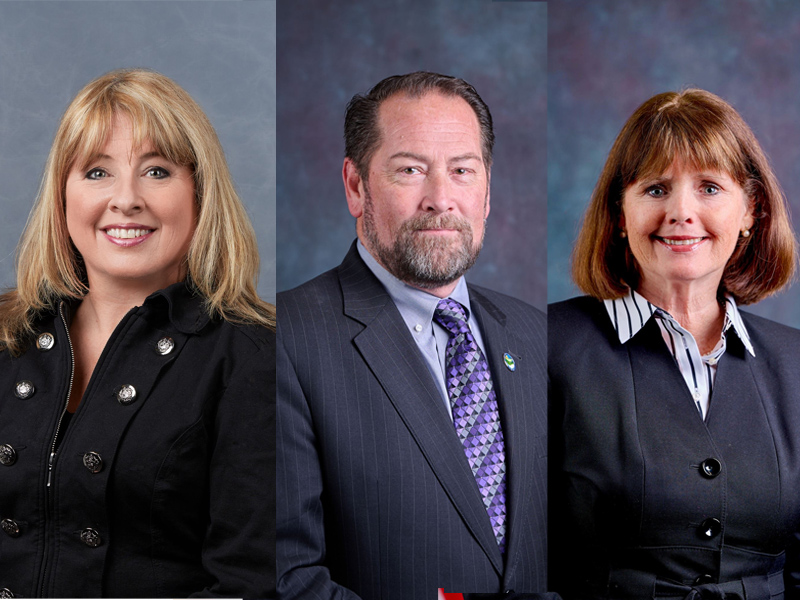Contra Costa County supes follow rotation and vote Andersen to vice chair role

CONTRA COSTA COUNTY, CA (Oct. 19, 2023) — Just days after a dust up among Contra Costa County Board of Supervisors over who should be rightful occupant of the vice chair’s role, it seems all is right in the universe of local politics.
The issue was revisited on Tuesday when Supervisor Ken Carlson, who previously was named to the vice chair role on a split vote, brought the matter back up for reconsideration. The second time around, by a unanimous 5-0 vote, Supervisor Candace Andersen was named the vice chair, effective in January.
Carlson stated that while he understood there was not a specific rotation, each district does need an opportunity to have a voice as chair in the spirit of promoting equity and collaboration and made the motion to support Andersen.
“I appreciate Ken Carlson bringing this issue back, making the motion, and believe that it was the right thing to do,” Andersen said.
Long-standing pattern
At the heart of the dispute was an apparent break from a long-standing rotation pattern that boards have followed in deciding who serves in the chair and vice chair roles.
Last week, when Board Chair John Gioia put forth the proposal for Carlson, the first openly gay member of the board, to serve in the vice chair role and then assume the chairmanship in 2025 after Supervisor Federal Glover, it was seen by some that Carlson was unfairly jumping the queue.
“I was honored and did not believe it would be controversial,” said Carlson. “It was never my intention to make others feel marginalized, because as an openly gay LGBTQ+ man, I know how that feels.”
Supervisor Diane Burgis, who viewed it was slight to Andersen, saw it as nothing more than “a power grab” and called the decision to put aside the regular rotation of these positions through county as “a betrayal of mutual trust.”
With time to reflect on the issue, Burgis viewed the re-examination of the vice chair issue as a reflection of her faith in her colleagues to do the right thing, and “the culture collaboration and civility” she has worked hard to build.
Andersen noted that the established rotation, when it is followed, allows each district to have its representative chairing the Board of Supervisors every five years. Changes take place when someone new is elected to office right at the time it’s their district’s turn to chair, or by agreement of the Supervisor whose turn will be affected.
There have been on occasion cases when the regular rotation has not happened, but in those situations the entire board has supported the action without controversy.
So, in accordance with the established rotation practice, Carlson will now wait two more years to be vice-chair. He will follow Burgis who will serve as vice chair in 2025 when Andersen ascends to lead the board. Carlson would then take on the vice chair’s role in 2026 and ultimately be chair of the board in 2027 per the district rotation.
Fair and equitable process
“We plan to discuss this issue early next year and memorialize it in a policy so that we won’t have unfortunate incidents occur, as did here,” Andersen said.
Carlson echoed this sentiment, calling for a fair and equitable process for representation.
“Each district does need a voice as chair,” he said.
In light of the board’s action, Anderson believed it is prudent to wait several years before chairing the board, “as there is so much information to digest and understand in the first few years in office as a supervisor.”
“Like Ken, I had served on a city council for many years prior to becoming a supervisor, but it was still a steep learning curve,” she added.
Not one to hold grudges, Andersen noted that 22 years in public office has taught her the importance of moving on from disagreements to find areas that everyone can agree on.
“I am confident that moving forward we will put this matter behind us, and work collaboratively for the good of the county,” she said.

David Scholz
David Scholz is back in journalism as a freelance writer and photographer after nearly two decades in education. Prior to moving into teaching in 2000, he worked as a full-time journalist since 1988 for rural community and small daily newspapers in Central Ohio and Northern Nevada, and later in California with The Business Journal in Fresno and dailies in the Bay Area, including The Oakland Tribune and The San Francisco Chronicle. More recently Scholz also worked in an editing, writing, and page layout role with the Rossmoor News.
